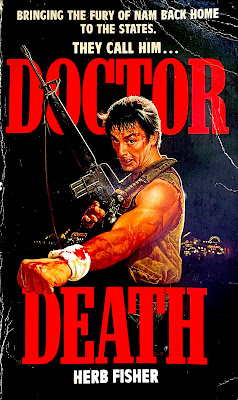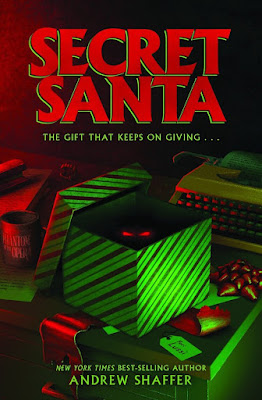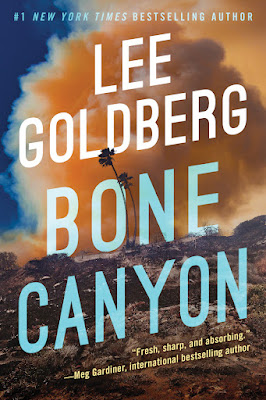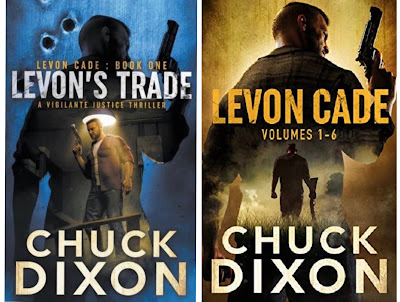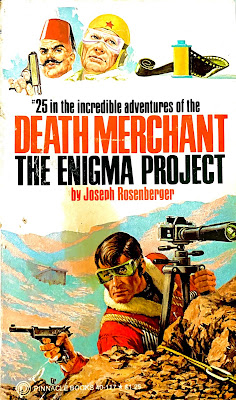Beginning at age 55, Fisher had enjoyed writing so much that he wrote five screenplays, a novel and two television scripts. His agent suggested that one of the screenplays would be better suited as a book. The screenplay, Doctor Death, was whittled down to an epic novel. Eventually, that was trimmed and edited into a four book series of men's action-adventure paperbacks published by Berkley. The first novel, simply titled Doctor Death, was published in 1988 with misleading cover art and blurb. After reading it, I feel strongly that Herb Fisher deserved better treatment from his publisher.
Upon first glance, Doctor Death appears to be a late 80s cash grab targeting Mack Bolan fans. The concept of a Vietnam vet returning home to become a vigilante had become stale by the late 1970s. Dozens of movies and hundreds of books utilized the formula and most of them are all entertaining to a degree. But, after reading the first 100-pages of Herb Fisher's book, I began to understand that this isn't a cookie-cutter, “law in your own hands” styled action-adventure. It's much better than that.
The book's 18-page prologue takes place in the green jungles of the Mekong Delta in 1969. Army Special Forces (Green Beret) Sergeant Kyle Youngblood is fiercely defending an American camp as a large Vietcong battalion attack. As his fellow soldiers die, Kyle experiences a range of emotions from shock to raw, animalistic anger. Using grenades, mortars, wire, and guns, Kyle is able to hold the line while bleeding from a leg wound. When a backup platoon arrives, they find Kyle unconscious and nickname him “Doctor Death.”
The first chapter places the narrative in the present day where Kyle is now a farmer in Silver Lake, Nevada. He's living a happy, quiet small town existence with his wife and two young children. Everyone in town is fond of Kyle and considers him a hometown hero. In the opening chapters, readers are introduced to the Fallon family. They reside 25-miles west of Kyle and control a large portion of the Las Vegas underworld. In a backstory, it's explained that Marty Fallon was shot by rival mobsters and paralyzed from the waist down. He controls the action from a wheelchair in his posh, enormous mansion. His sons are screw ups, but they maintain a portion of the mob action. The youngest, Buddy, is Marty's pride and joy. But, Buddy is a wild man, sort of a juvenile delinquent right out of a 1950s crime-noir. He's a buck-wild drinker, gambler, and womanizer partying through life with his father's endless supply of money.
On Kyle's trip into town to purchase supplies, he makes a poor decision to stop in Andy's Place for a quick drink. Buddy is inside, backed by two enforcers, drinking and talking smack to anyone who will listen. Surprisingly, Kyle ignores all of it as a promise to his wife that he won't fight again. But, when Buddy's Lincoln and Kyle's beat-up pickup truck collide in the parking lot, all Hell breaks loose. Kyle is happy to swap insurance cards, but Buddy wants to swap fists. Provoked into the fight, Kyle ends up injuring the two enforcers and killing Buddy. The town sheriff is owned by the mob, so Kyle is jailed even though the fight was self-defense.
The court releases Kyle on bond, but he can't escape the trouble. When Marty learns that Buddy is dead, he places a hit on Kyle and his family. Several enforcers attempt to kill his family, but Kyle survives. In the book's third act, Kyle and his family are thrown to the wolves by the local law enforcement. They allow a mob army to descend on Kyle's farm to obliterate everything standing. The book's finale has Kyle defending the farm in the same manner as he did in Vietnam. But, instead of Army supplies, Kyle is left to make an unusual defense using farming tools and household items. The final battle is nothing short of spectacular.
Herb Fisher gets everything right with Doctor Death. Kyle is an admirable protagonist and his willingness to sacrifice himself for his family transcends from the printed page to the beating heart. I cared about these characters and raced to the end just to learn of their fates. But, it's the little details that Fisher includes that make all of the difference.
So many books and films miss key moments to build small side-stories that will later become important events later. Fisher gets it. In the beginning, Kyle learns that the store owner doesn't have the ammo he needs. Instead, he has to settle on an undesirable caliber. This will play a large role in the book's finale. Or, something as simple as Kyle aiming a rifle, but placing extra shells between each of the fingers on his left hand for easy reloading. This reinforces battlefield experience. It's a statement that Kyle is a believable hero. Fisher even adds in the fact that the sheriff doesn't remove his hat when talking with Kyle, but the deputy does. It solidifies a good relationship, an alliance, between the deputy and Kyle. These little things are important.
While I'm sure Fisher was delighted that his books were published by Berkley, the publisher misled the consumer. Kyle isn't the “M-16 vigilante of Vegas” like the cover suggests. I recently acquired the second and third books of the series and they have equally frustrating covers. While I enjoy The Vigilante, Sharpshooter, The Executioner, and so forth, Doctor Death isn't that type of debut. It's a different presentation and style, a screenplay to the extent that it fits into a novel. In other words, make an appointment with Doctor Death and take your damn medicine.
Buy a copy of the brand new edition HERE

